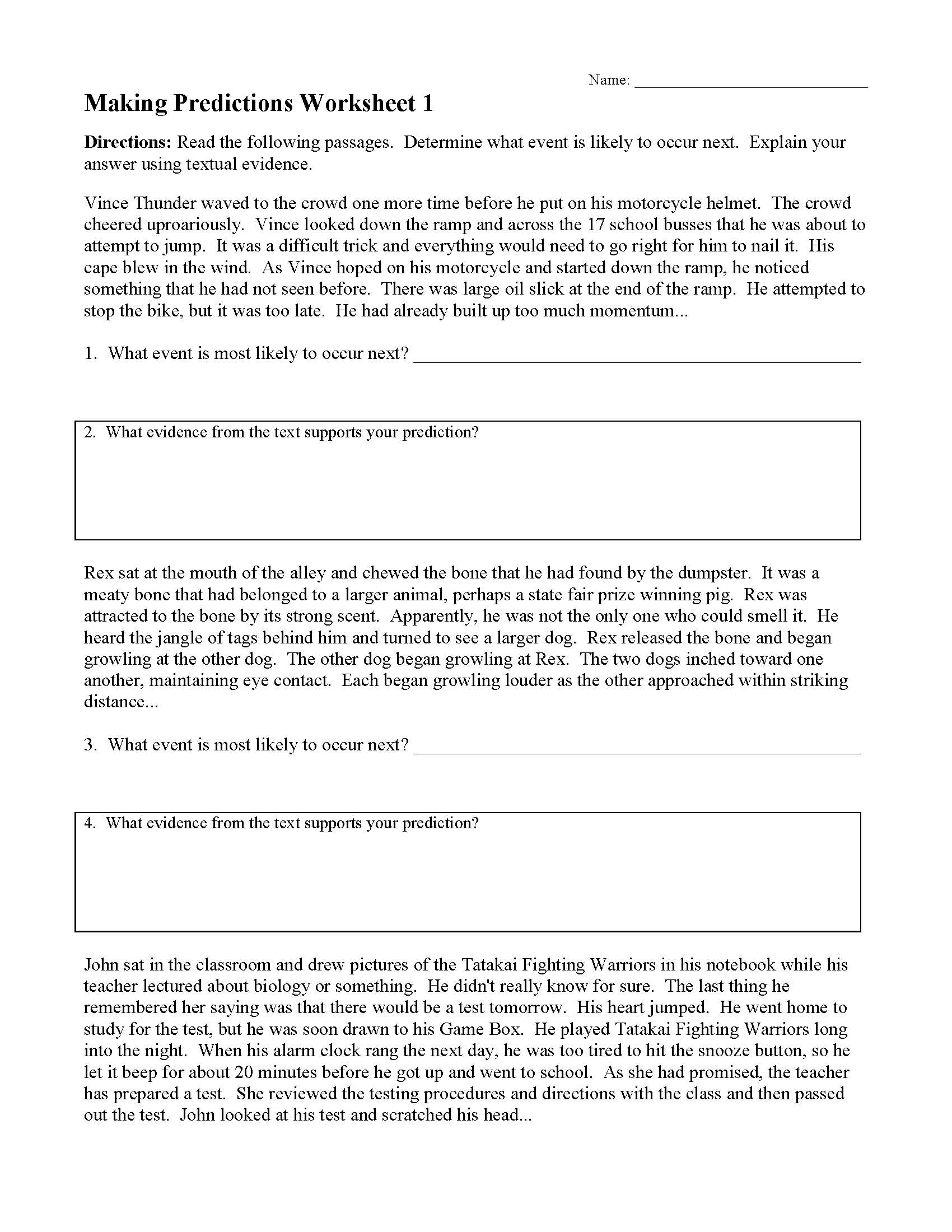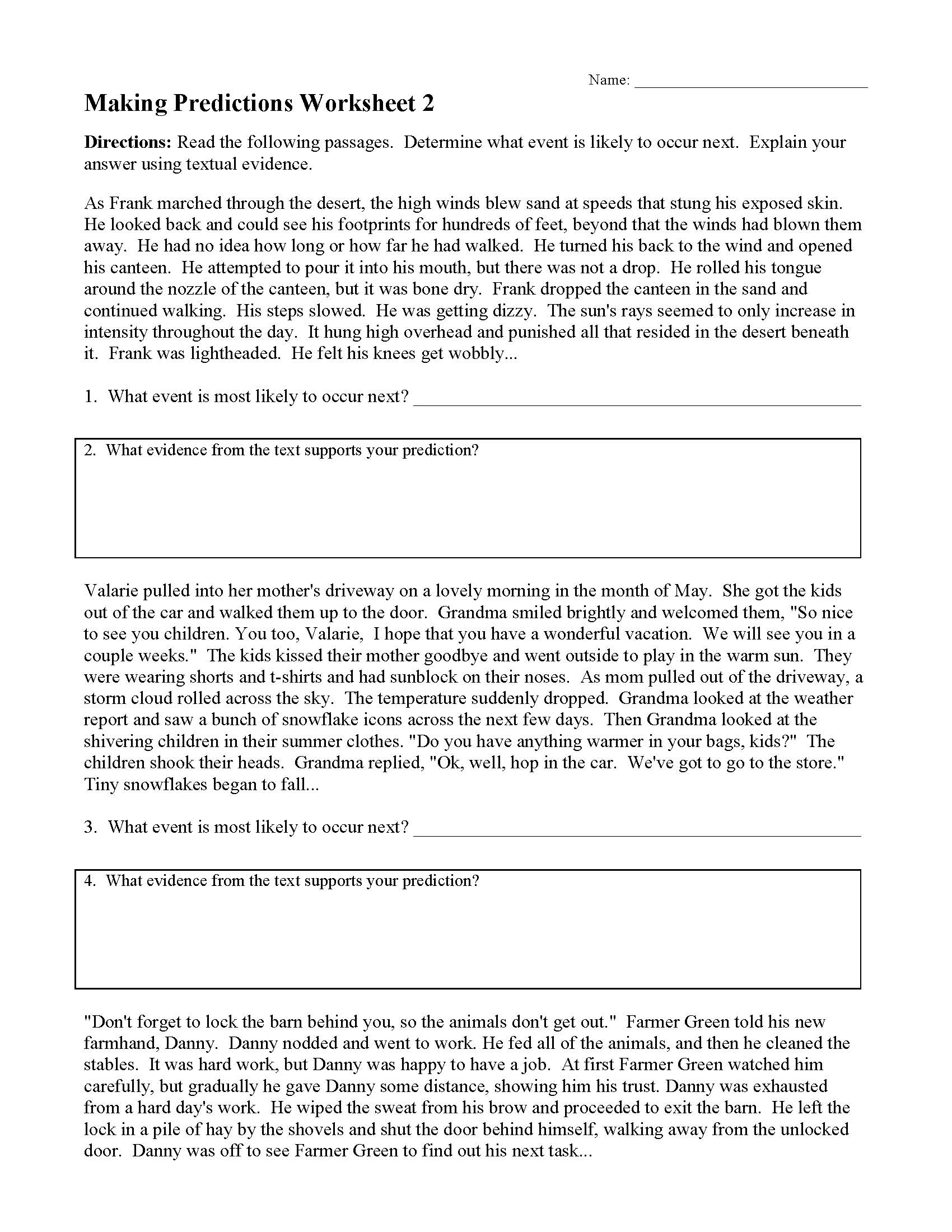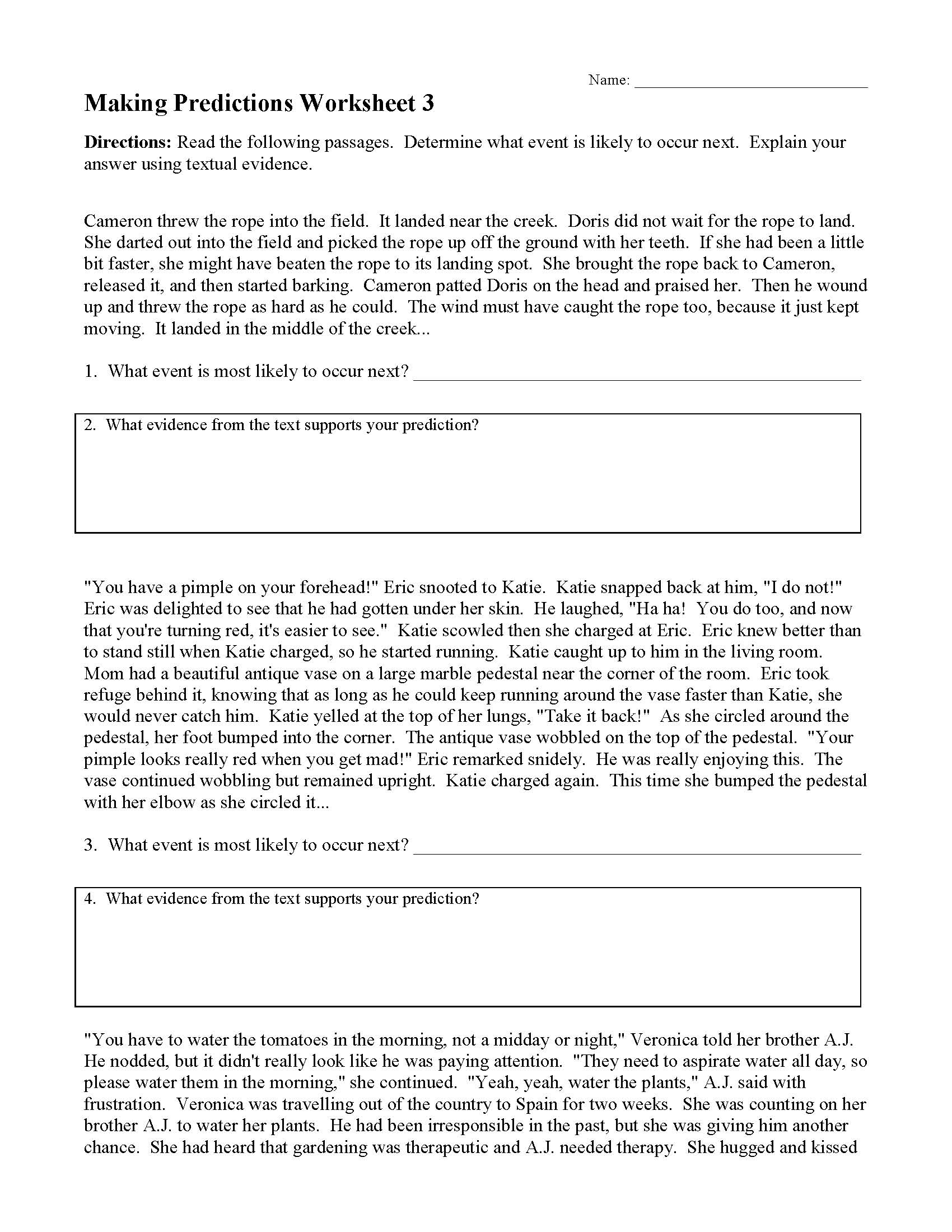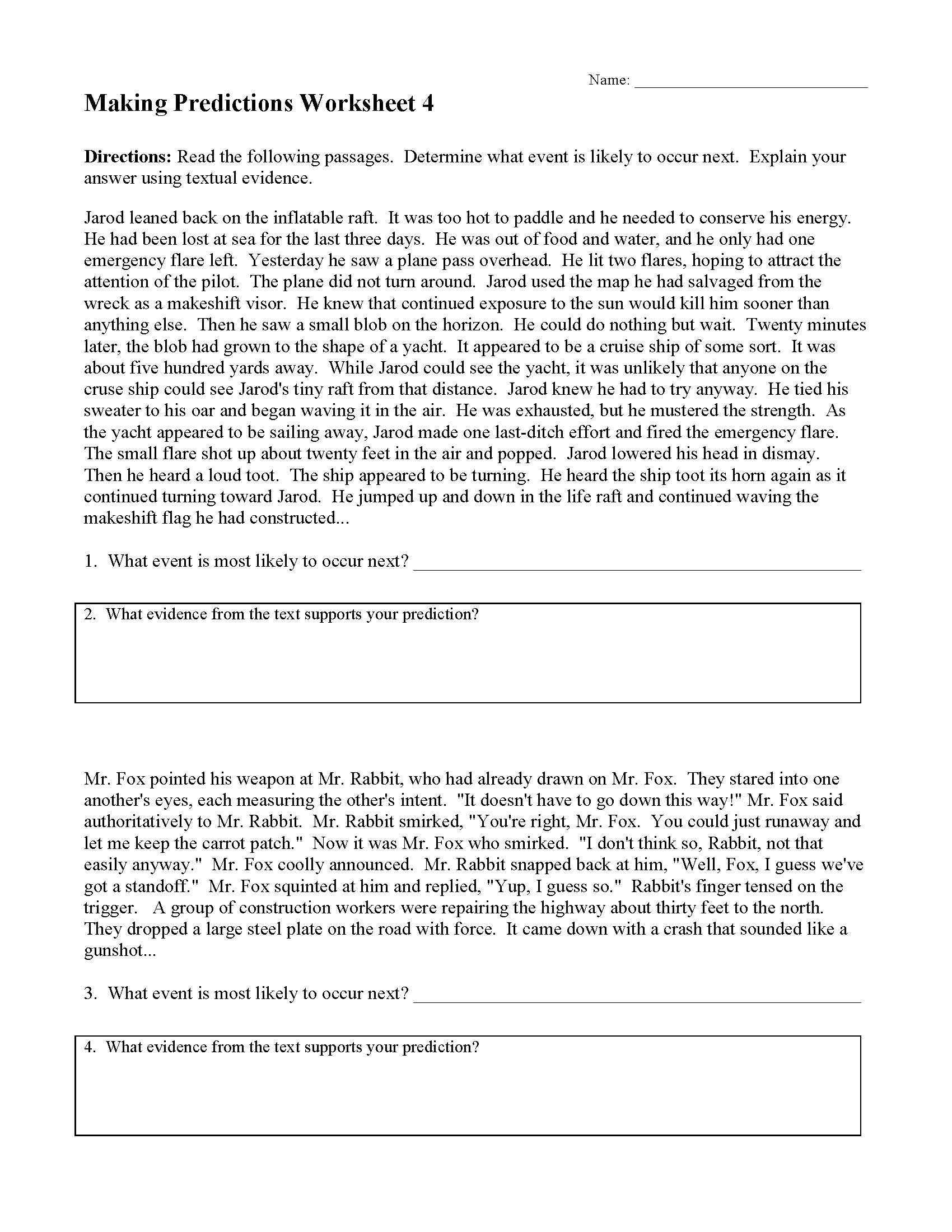Making Predictions Worksheets
Making predictions is a basic reading skill that requires higher level thinking. To make a good prediction, readers must consider available information and make an inference. Good readers make predictions based on textual evidence. If you use evidence to support your predication, you can justify it whether you are right or wrong.
I designed these worksheets to give students intensive practice with making and supporting predictions. In each worksheet students read a variety of short texts. Each passage ends abruptly and then students must predict what will occur next based on evidence from the text. Students must support their answers by referencing the text, which brings out those higher order, critical thinking skills. I've also included a PowerPoint lesson on making predictions. I hope that these worksheets and activities will help students master the art of making predictions.






Making Predictions
Common Core State Standards
RL.4.1 - Refer to details and examples in a text when explaining what the text says explicitly and when drawing inferences from the text.
RL.5.1 - Quote accurately from a text when explaining what the text says explicitly and when drawing inferences from the text.
RL.6.1 - Cite textual evidence to support analysis of what the text says explicitly as well as inferences drawn from the text.
RL.7.1 - Cite several pieces of textual evidence to support analysis of what the text says explicitly as well as inferences drawn from the text.
RL.8.1 - Cite the textual evidence that most strongly supports an analysis of what the text says explicitly as well as inferences drawn from the text.
RL.9-10.1 - Cite strong and thorough textual evidence to support analysis of what the text says explicitly as well as inferences drawn from the text.
RL.11-12.1 - Cite strong and thorough textual evidence to support analysis of what the text says explicitly as well as inferences drawn from the text, including determining where the text leaves matters uncertain.
Search here.
30 Comments
Leave a Reply to Mr. Morton Cancel reply
- Author's Purpose Worksheets
- Characterization Worksheets
- Conflict Worksheets
- Fact and Opinion Worksheets
- Figurative Language Activities
- Figurative Language Poems with Questions
- Genre Activities
- Irony Worksheets
- Making Predictions
- Mood Worksheets
- Nonfiction Passages and Functional Texts
- Parts of Speech Worksheets
- Poetic Devices
- Point of View Worksheets
- School Project Ideas
- Setting Worksheets
- Simile and Metaphor Worksheets
- Story Structure Worksheets
- Text Structure Worksheets
- Theme Worksheets
- Tone Worksheets
- ALL PAGES AND WORKSHEETS







Cris
/ August 23, 2022Wow… Excellent material. Thank you so much, guys!
Zoe
/ June 6, 2022Thank you for your generosity with these resources and allowing editing. I needed to make the print larger for a student and highlight vocabulary. I will be using your resources again in the future.
Ann
/ November 6, 2020your sight is such a blessing!
Miri
/ April 13, 2020Nowadays when we are all looking for sources and creative ideas for teaching, your site is a blessing. Thank you so much. It is not taken for granted. You work very hard and share, for free your labor.
Miri, an English teacher in Tel-Aviv, Israel.
Mr. Morton
/ April 13, 2020You are so welcome. Thank you for visiting!
Stacey E Jones
/ October 11, 2019Hello! Thanks so much for this information! I really appreciate it and I will definitely use it to teach my students. God bless!
Lu, Shuh-hsin
/ August 3, 2019Thank you so much for sharing. I’ve got a general idea about how to use and teach prediction.
by Lu, Shuh-hsin
Kelly Altman
/ April 17, 2019On the worksheet for Making Predictions 1 there is a typo for #1- It should say Vince “hopped” not hoped.
Just FYI
Jeanalyng arellano
/ February 18, 2019Thankyou so much . Now i’ve got an idea on how to teach making predictions
xoxoxoxoxo
/ January 24, 2019A wonderful website.It helped my kids passing their exams
Alex
/ January 7, 2019Seriously, there are a lot of grammar errors in your materials. I can’t use your worksheets.
Mr. Morton
/ January 7, 2019That’s too bad. I’d like you to use them. What errors have you found? Maybe I can fix them…
MIA SE SEGOVIA
/ November 7, 2018I am very thankful today if you can help me with my research work.
Sonya Kageni
/ September 3, 2017I was so amazed with this site when I was teaching in the city. The activity was just perfect for my students but the passage were too long for my other group of students who weren’t first English speakers. It would be nice to find simple text activities that are appropriate for that group of students.
Thank you
Sonya
Michael Holson
/ March 6, 2017I am a GED/Hi-Set Instructor. This site has helped me pass a lot of my students. Thank you for you great work!
daisy
/ February 18, 2017just got across with these worksheets..thank you! a great help indeed!
blossom
/ January 23, 2017Amazing worksheets, very useful
Roberta Carver
/ December 4, 2016It has to be something with my computer; I am going to contact tech support tonight. Thanks so much for your help!
dawnf
/ October 29, 2016I am amazed at the plethora of awesome materials you provide! As a middle school ELA and reading teacher, I am so very indebted to you for providing these wonderful resources. This quality of materials is rare to find, ESPECIALLY for reading!! On top of that, you share them for free! WOW! I often use them as warm ups so that we can have instant feedback and quality discussion of each passage. It is a great way to begin class, with the students becoming familiar with one concept every week or two and growing stronger and more confident in that concept throughout the week, thus giving them a chance to start class each day with a success. Thank you so VERY much for this resource!!! PS I have not noticed a “number of errors,” but if I did, I would simply upload as a Word doc and fix them myself.
Lisa
/ October 26, 2016My question is, in the mind of the student is there a right or wrong answer?
As an example with Mr. Fox and Mr. RAbbit. Its obvious as an adult, one may get shot. I however do not want to take that route with my son. In his perception can they both have gotten scared and run off?
That also can be supported.
Mr. Morton
/ October 27, 2016I’m all for giving credit to any answer that is well-supported.
Di R
/ October 21, 2016I have found your worksheets particularly helpful. Thank you very much!
Anastacia Miller
/ March 21, 2016Thank you!! I love your work! I use these in my classroom and they help my students a lot. Finding quality resources can be a hassle, but you’ve made yours free for all to use. THANKS!!
ralph
/ February 21, 2016what is predict outcomes based on the selection and 5 question answers
Furukawa Mikan
/ January 31, 2016Thank you very much for making this. It is really helpful. I hope that you’ll make more than what you’ve did already. God bless!
Michael
/ January 23, 2016All your worksheets have been very gratefully received. Thank you so much for your hard work and making them freely available.
Cathy W
/ July 30, 2015Thanks so much for making these available. I teach Deaf and Hard of Hearing students in Australia, who often have difficulty with predictions and inference. I have battled to find a set suitable for a High School student, rather than the ones I have in abundance for younger students, so these are great! Thanks for saving me so much time.
Laura D
/ June 2, 2015I am also an SLP who uses your site very frequently. I love it. in reference to your above comment, there is a typo in “Making Predictions Worksheet 1″.
” As Vince hoped on his motorcycle”
Sherry Walker
/ May 6, 2015Hi. I’m a speech and language pathologist at the high school level. Your worksheets look helpful for some of my students with various language goals. However, one thing I’ve noticed as I’ve looked them over is that there are a number of spelling and grammar-type errors. It would be nice if they were proof-read a little closer. Thanks.
Mr. Morton
/ May 18, 2015Thanks for visiting. I am actually a decent grammarian, but I’m just one man. Please report errors as you see them and I will fix them. Best wishes.